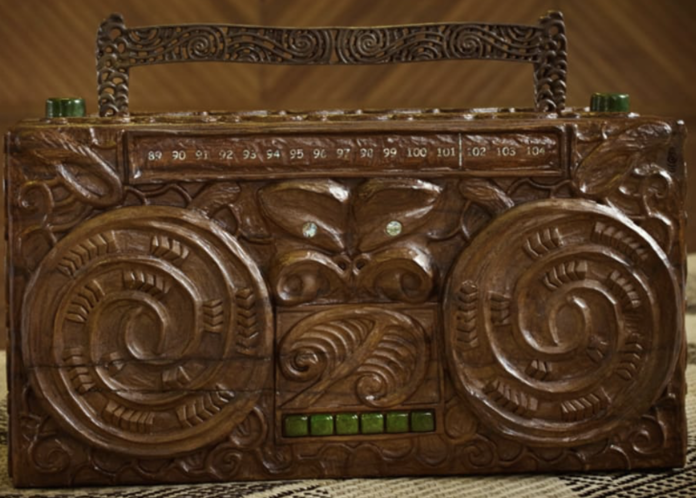Fortnightly. Really? Nothing on radio, on television, in newspapers, in podcasting is fortnightly is it? Nothing. The promo for ‘Mata’ with Mihirangi Forbes I heard on RNZ National today just said after the 6:30pm headlines on Tuesday as if it was every Tuesday. The two episodes already uploaded to the RNZ YouTube channel are two weeks apart and their promo on it says fortnightly. The page for the show on the RNZ website doesn’t even say when it airs in the schedule. Really. What to make of this anomalous timetable ambiguity?
What to make of 30 minutes every fortnight for a show, a podcast, on election year politics, Maori politics. Is there enough of a show to even review? The political podcasts I know, all three, are an hour. And weekly. So what does half an hour every two weeks look like for a podcast that’s filmed as TV, heard as a radio programme and then distributed to the usual platforms as secondary to broadcast. What media even is it?
The two episodes uploaded to YouTube have 1.3k and 1.4k views so far – in line with the other low rating special series from RNZ, but far below other media organisations (eg. The Platform shows on You Tube are ten times those viewership figures).
Some curious soul might care to look up the amount given by the two funders – NZ On Air Public Interest Journalism Fund and Te Mangai Paho – for this thing, but it wont be me. It’s all about the art and not money, these reviews. Is it any good – that’s the question, not how much it costs, that’s prejudicial evidence that cannot be heard, only relevant on conviction if guilty of being shite. The inevitable wince when we inevitably see the budget is due to the minimal content delivery. My conclusion is it is doing the minimum necessary to tick the boxes, lets get to why via what.
To the question of what is it?
I caught the second episode as it aired. It sounded just like Forbes’ previous RNZ show ‘Party People’: an orderly agenda, passively chaired, formal questions, amicable robust debate everyone waiting in expectation of Tau Henare saying some cock thing. A panel discussion.
Henare wasn’t on (he was on the first episode), the other Maori mainstream mainstay, Shane Te Pou was. His take on Tamati Coffey needing to give up on Waiariki was validated a few days later when he announced his retirement (so Te Pou is now a guru in commentator terms). Jenny Marcroft, a name I had not heard in decades, was the other leg of the panel. So far so conventional, blazers, scones, tea. It was fairly dull to be frank, but one of her observations of Matatini funding comparisons and culture heirarchy struck me: that visitors to NZ don’t come here to see the symphony orchestra<! Yes it was amusing to me, not just because it’s simultaneously demeaning and true, professionally hurtful and unnecessary, but because RNZ National’s evil Aryan twin, RNZ Concert – when it isn’t blitzing the airwaves with the maestros of the Third Reich in boot-clicking crisp Naziphonic stereo – do tend to play quite a bit of the NZSO, so she was taking a dump on Concert too; which was nice. (Concert will be the topic of a future review)
Watching on YouTube later was a slightly different experience. Whereas Party People, although videoed, was definitely a radio style podcast Mata is a television style podcast. It is essentially a TV show in every respect. Forbes is reading an autocue, everyone is in make-up, full lighting, video link interviews.
With TV the camera is the audience and that is a different dynamic than radio where the mic is not and a conversation can be had without the conscious physical presence of this other party. A TV performance is different to a radio performance. The audience experience is different. For example: if you have the lights on Forbes’ white sneakers under the table and she’s swinging her feet and twitching all the time as she does the viewer will notice. They will notice, I noticed; but maybe she hasn’t. It was like they were the fourth character on set. Forbes would sound stern, but we see her feet playfully dancing and we know it’s a put on. On radio it sounds mercilessly pedestrian, on video the viewer has the mercy at least of a pedometer distraction.
The conventionality of the TV format goes into the composition. An interview with the newsmaker (politicians so far) then panel discussion. I cannot imagine the radio format and especially not the podcast format having a host-subject interview followed by a panel – that is classic television. The big ego one-on-one interview, with barely 15 mins of panel discussion – an anathema to podcasting.
The one thing it is is the only thing it is not. It is television, but it is broadcast on every platform except television. Having answered what it is categorically and that it exists out if its natural state in all media but that for which it was seemingly designed can we say why it exists?
It is all funding at the beginning and end, of course. The government funders are the only relevant stakeholders not the audience. It’s a TV show pitch that TV didn’t want. Gotta be. RNZ needed to tick the minimum Maori boxes which they are not competent enough to fill in-house because they are institutionally racist. Forbes is part of a small group of contractor broadcasters in a small talent pool. Those are the facts, the result of which is this improbable commission: a fortnightly half hour television show made for radio that’s being called a podcast.
This fatal flaw does not diminish Forbes as the host per se. Her two interviews have been extremes however. Her second, with Rawiri Waititi, was smooth and sweet, like ice cream; but the first with Kiritapu Allen was the toxic, bitter, taste of carcinogenic corriander. Forbes robotically, unblinkingly, dismantling the shell-shocked minister like a Maori Dalek set to exterminate. Allen was making excuses for the forestry industry and Forbes wasn’t having it no matter how much an agitated Allen talked over her. It was ferocious. Are we not entertained! But that and a chat for quarter of an hour on a dozen subjects with two suits is not a podcast. Less in this instance is certainty not more.





Great blog.
Will look forward to the RNZ Concert review.
Your writing is fabulous as always.
Ae. Forbes is on the funding ticket clipping gig(s). No substance, just pure drivel. It’s funny when she claims to be too busy to be a board member for an illegitimate entity that she claims to be a member of. This iwi board doesn’t produce any minutes upon request nor does it have legitimate elections.
Maybe its about priorities and then choosing which needs more attention to achieve something meaningful?
Very good review – bright and to the point. I am just about giving up on RadioNZ – or the confusing RNZ. Cost-cutting and minimalising on the name, broadcasts an ephemeral tie to the ties of national radio. But I will read these reviews which might give hope and an occasional giggle too.
“I am just about giving up on RadioNZ”
Ya can’t bloody do that @ Grey!
Aspects of it might be complete shite, but then it’s better than the alternatives – especially if you can’t stand the bullshit ads trying to force shite down our throats we don’t really need.
No, we just need to get rid of half a dozen people (mainly those whose upbringing has been in a commercial environment, and with big egos, and who are still trying to commercialise things without the actual ads).
Unfortunately the party of good intentions and unintended quinsequences stuffed up the planned merger – forgetting of course who the biggest ‘STAKEHOLDER’ was and is (in this space, going forward). I.E. Joe and Josephine Public
Just to say something positive about RNZ – I thought this was useful.
https://www.rnz.co.nz/news/national/486282/explainer-what-are-your-rights-when-faced-with-a-building-dispute
That is savage. My niece is in a school play later in the year. I’d prefer it if you didn’t come within 200 metres of the venue. Thanks.
Complex. What could your niece suffer, and you fear pray?
So shoot me for the grammatics and errors in the above comment but this attack on RNZ is becoming a bit too fashionable amongst those that have done their ‘research’.
What EXACTLY would you prefer from a PSB system you are contributing to its demise?
Please let us all hear it
Forbes alone, probably ticks a few boxes. That’s useful. Providing non-theatening fare (to the corridors of power) is useful also. What else, time will tell…